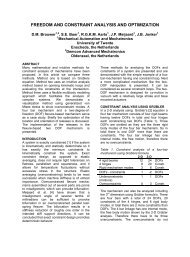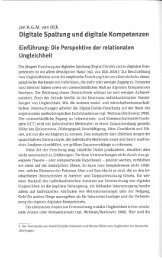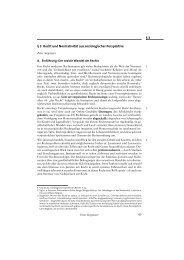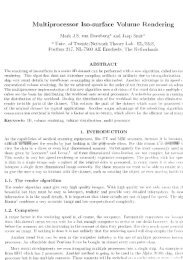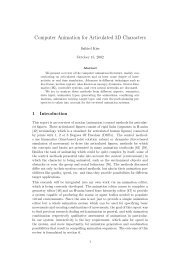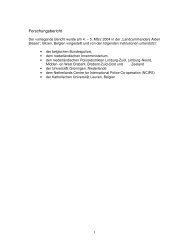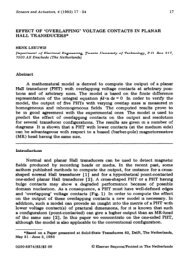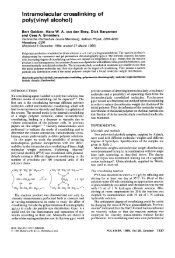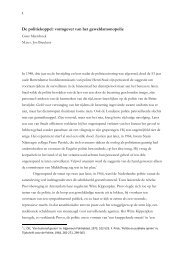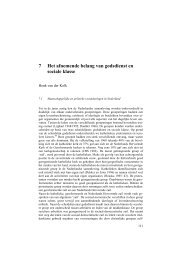Innovation and institutional change: the transition to a sustainable ...
Innovation and institutional change: the transition to a sustainable ...
Innovation and institutional change: the transition to a sustainable ...
You also want an ePaper? Increase the reach of your titles
YUMPU automatically turns print PDFs into web optimized ePapers that Google loves.
Evolution of decentral cogeneration in <strong>the</strong> Ne<strong>the</strong>rl<strong>and</strong>s 139<br />
<strong>and</strong> facilitating expansion <strong>to</strong> fuel economic growth were complemented by a<br />
focus on energy saving, resource diversification <strong>and</strong> environmental issues.<br />
(2) The existing ac<strong>to</strong>r constellation <strong>and</strong> power relationships <strong>change</strong>d as<br />
government aimed <strong>to</strong> increase central control of <strong>the</strong> system, a process of<br />
reorganisation went underway in <strong>the</strong> production <strong>and</strong> distribution sec<strong>to</strong>r <strong>and</strong><br />
<strong>the</strong> SEP increased its influence at <strong>the</strong> expense of <strong>the</strong> distribution sec<strong>to</strong>r<br />
(Vlijm, 2002: 74). (3) The unquestioned acceptance of <strong>the</strong> electricity system<br />
as a natural monopoly ended as societal <strong>and</strong> industrial ac<strong>to</strong>r groups argued<br />
that exp<strong>and</strong>ing room for private producers would increase overall efficiency<br />
of <strong>the</strong> system. (4) The emergence of <strong>the</strong> gas turbine as a more flexible means<br />
of production disrupted <strong>the</strong> logic of increasing scales of power plants.<br />
Finally (5), mind-sets regarding <strong>the</strong> electricity system were altering as a shift<br />
was set in motion from a single focus on electricity generation <strong>to</strong> a focus on<br />
<strong>the</strong> combined provision of electricity <strong>and</strong> heat.<br />
If we contemplate <strong>the</strong> various dimensions of sociotechnical configuration for<br />
electricity supply <strong>and</strong> use, <strong>change</strong> processes in all dimensions can be<br />
observed during <strong>the</strong> seventies although this did not yet materialise in a<br />
significant uptake of decentral cogeneration. The nature of embeddedness of<br />
<strong>the</strong> electricity system in society <strong>change</strong>d radically. Change processes were<br />
set in motion through which basic assumptions were not taken for granted<br />
anymore, basic rules were in <strong>the</strong> electricity system were re-negotiated <strong>and</strong><br />
modified, information <strong>and</strong> communication flows regarding alternative<br />
practices were sharply increasing, new linkages were emerging involving<br />
new technologies <strong>and</strong> ac<strong>to</strong>r groups, new R&D directions were introduced, an<br />
more integral energy policy was initiated, <strong>and</strong> some structural <strong>change</strong>s were<br />
initiated such as allowing <strong>and</strong> supporting cogeneration as part of industrial<br />
policy separate from <strong>the</strong> electricity sec<strong>to</strong>r, <strong>and</strong> increasing heterogeneous<br />
compositions of advice <strong>and</strong> steering groups regarding energy policy <strong>and</strong><br />
R&D. Table 5.2 summarises some of <strong>the</strong> main <strong>change</strong>s in <strong>the</strong> linkages of<br />
different societal fields <strong>to</strong>wards <strong>the</strong> electricity system. Three levels are<br />
defined: <strong>the</strong> macro-level of modes of organisation <strong>and</strong> coordination in<br />
different societal fields, <strong>the</strong> meso-level of formation of networks <strong>and</strong> specific<br />
linkages <strong>and</strong> interactions; <strong>and</strong> <strong>the</strong> micro-level of changing routines <strong>and</strong> <strong>the</strong><br />
development of new practices. The table shows how a range of <strong>change</strong><br />
processes were set in motion, triggered by <strong>the</strong> combination of oil crises,<br />
environmental concerns, <strong>and</strong> societal activism <strong>and</strong> organisation.



